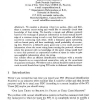1816 search results - page 20 / 364 » Trace oblivious computation |
DAGSTUHL
2006
13 years 11 months ago
2006
It is well known that unconditionally secure bit commitment is impossible even in the quantum world. In this paper a weak variant of quantum bit commitment, introduced independent...
EUROCRYPT
1995
Springer
14 years 1 months ago
1995
Springer
We coiisider a situation where two parties, Alice and Bob, share a common secret string arid would like to mutually check their knowledge of that string. We describe a simple and e...
SETA
2004
Springer
14 years 3 months ago
2004
Springer
In order to reduce key sizes and bandwidth, cryptographic systems have been proposed using minimal polynomials to represent finite field elements. These systems are essentially e...
PKC
2010
Springer
14 years 1 months ago
2010
Springer
In many practical settings, participants are willing to deviate from the protocol only if they remain undetected. Aumann and Lindell introduced a concept of covert adversaries to f...
CIKM
2009
Springer
14 years 4 months ago
2009
Springer
A communication trace is a detailed record of the communication between two entities. Communication traces are vital for research in computer networks and protocols in many domain...

